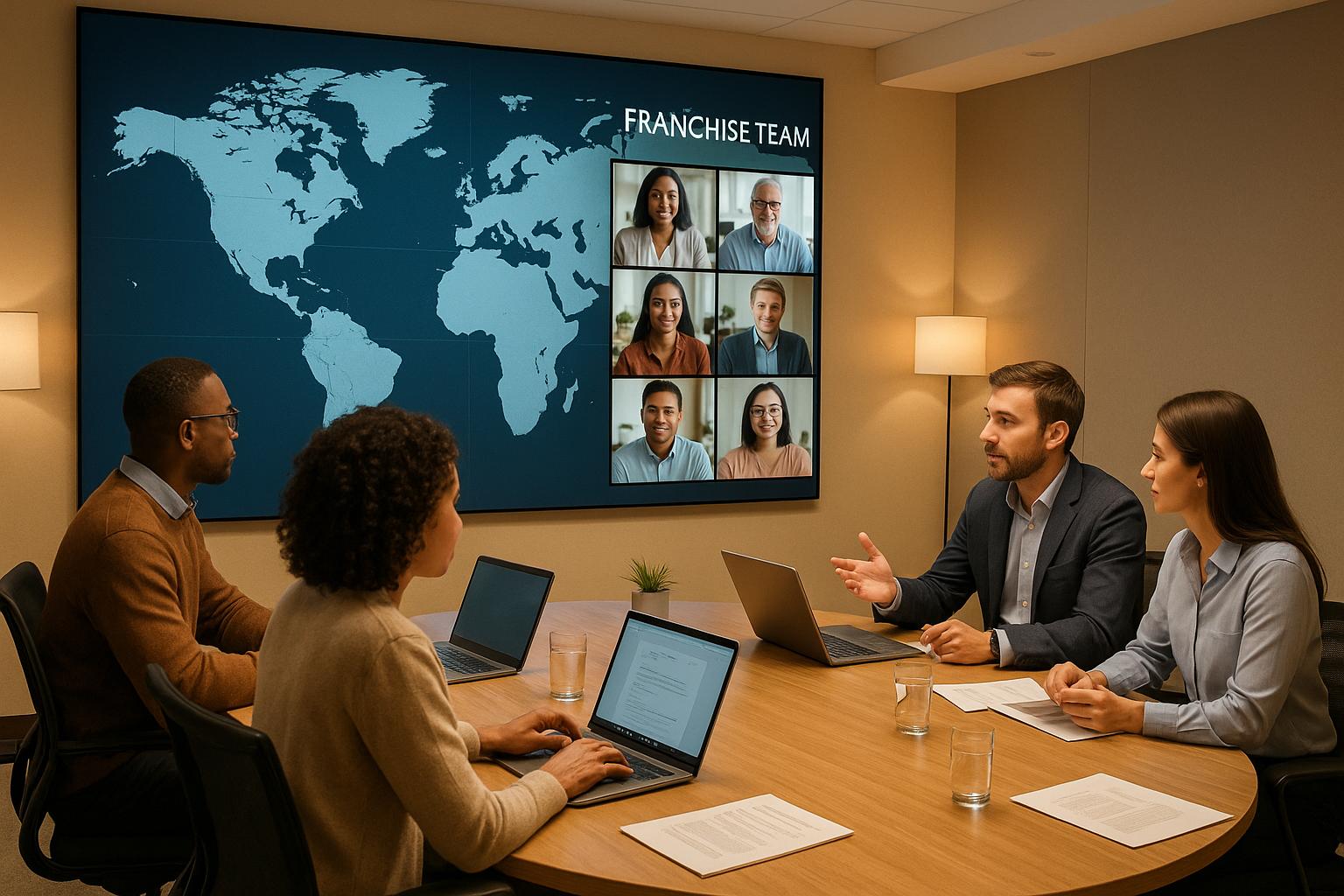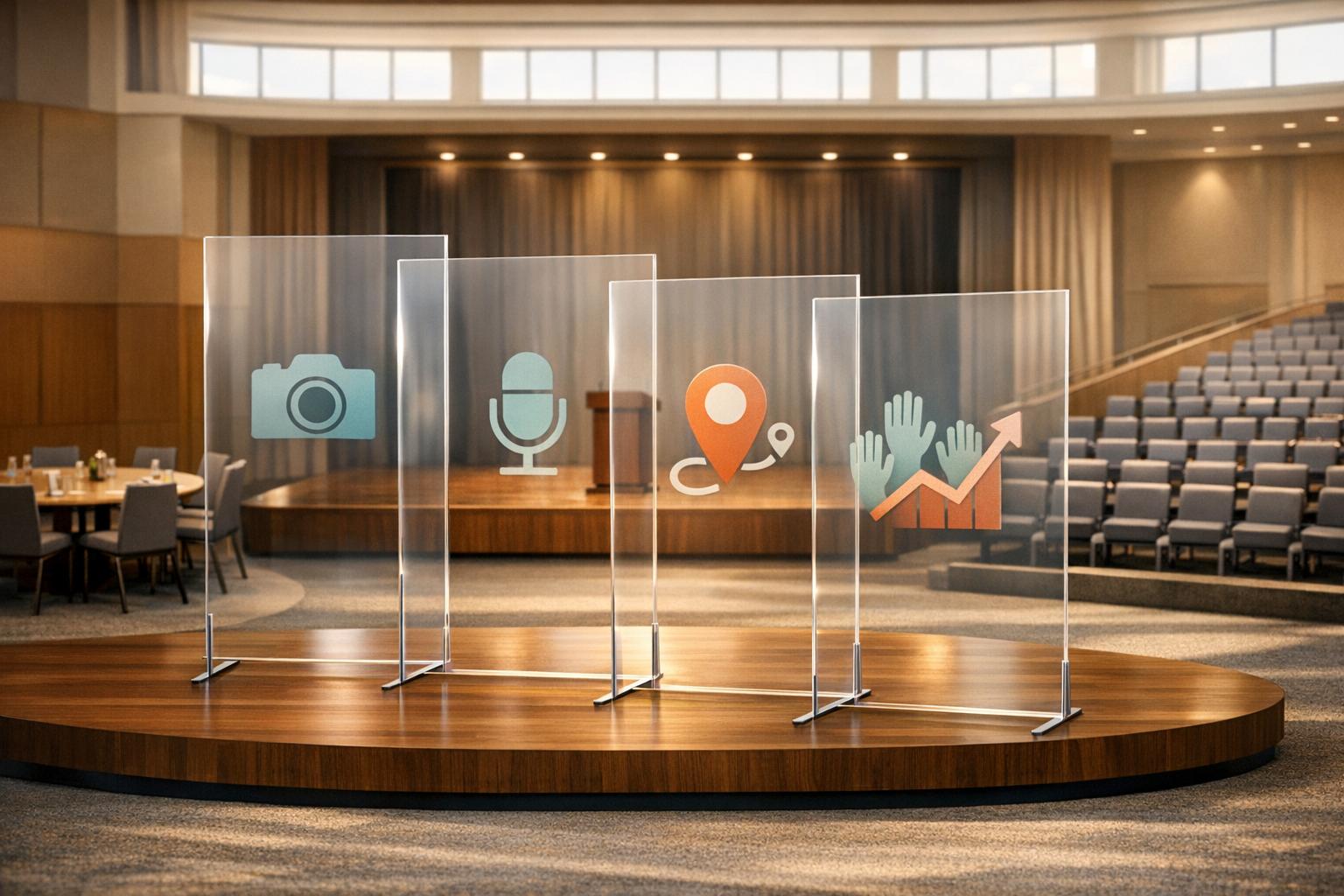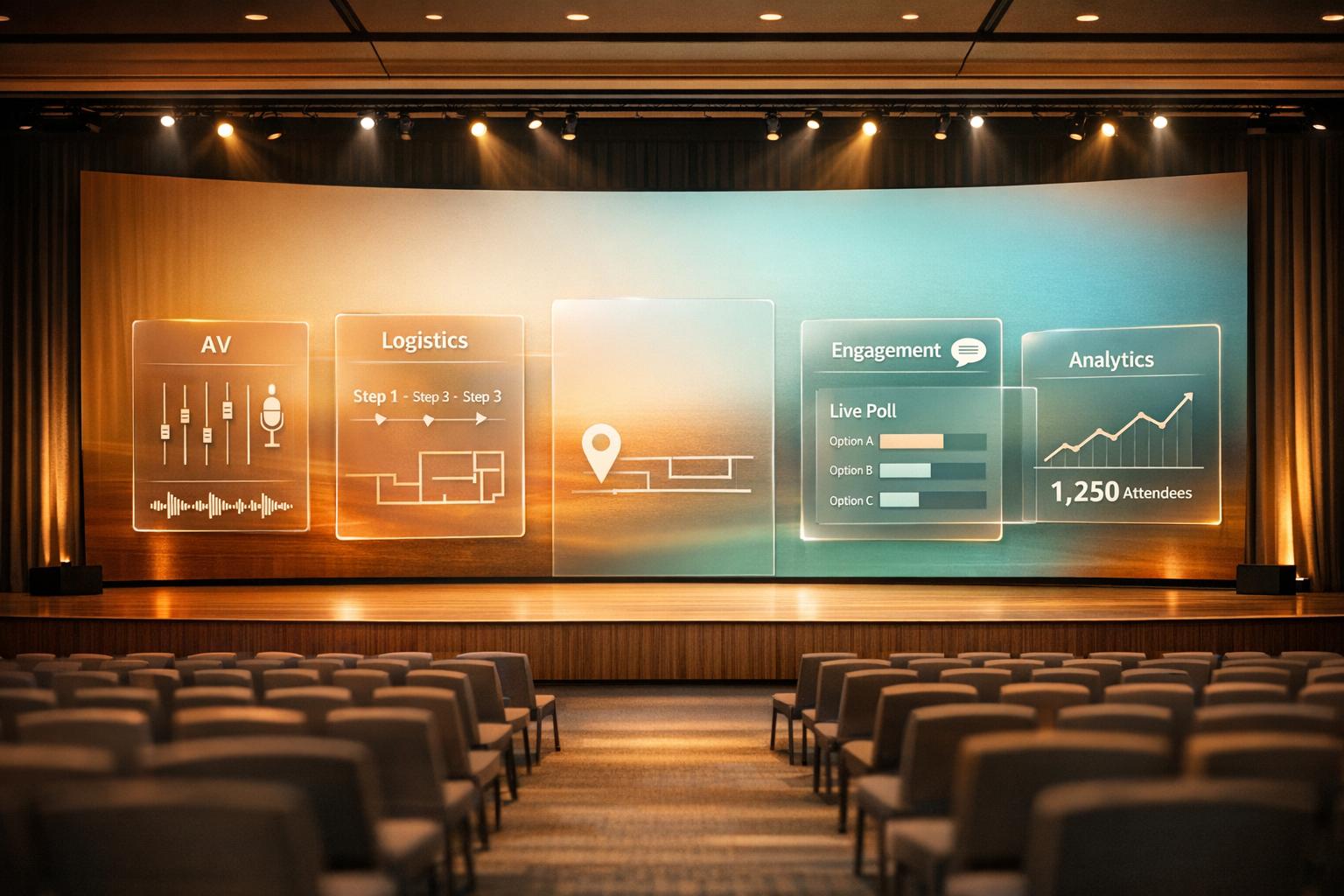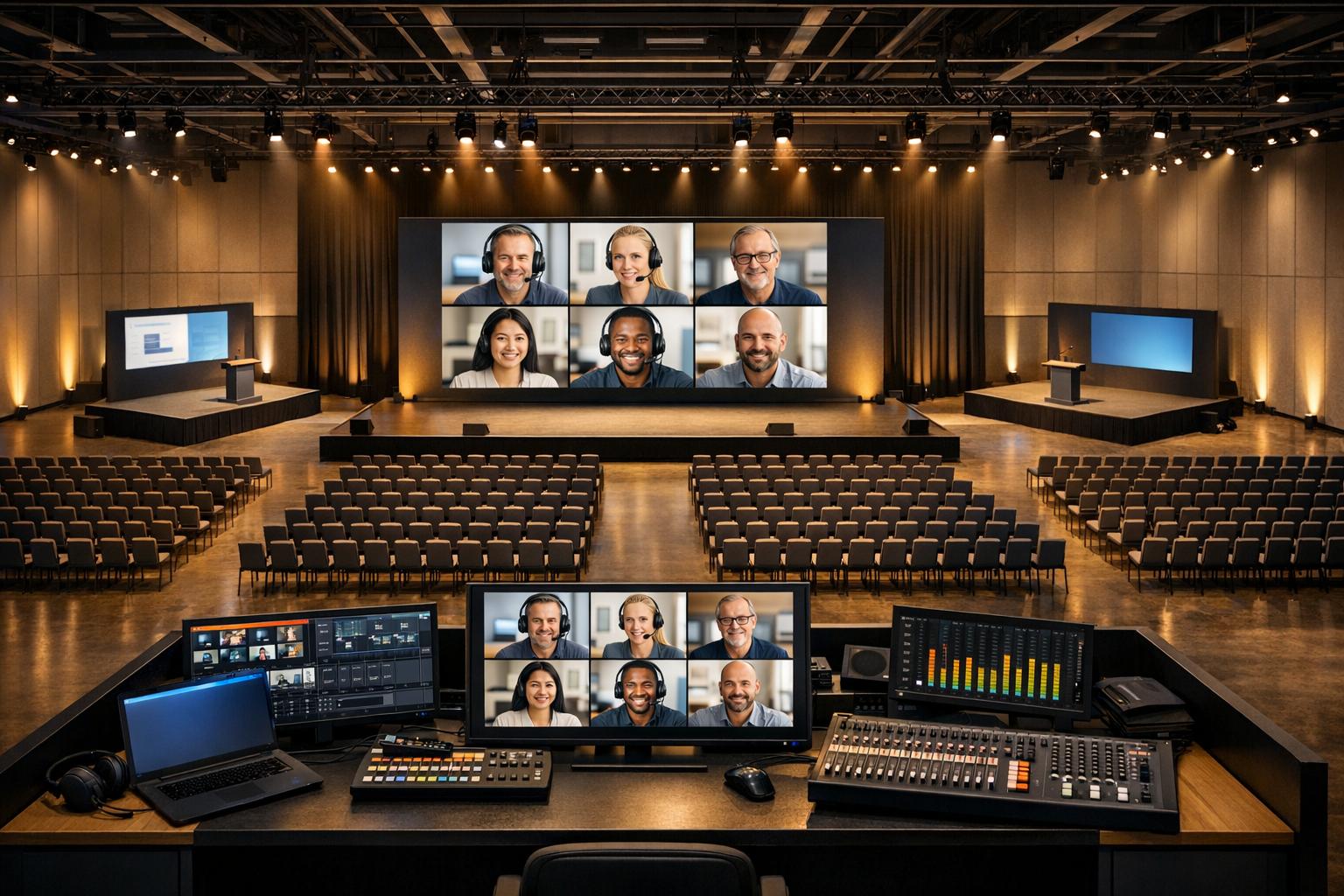How do Production Companies Support Global Franchise Meetings?

Chief Executive Officer

Production companies play a critical role in ensuring global franchise meetings run smoothly. These events often involve challenges like coordinating across time zones, language differences, and maintaining consistent branding. Here's how production companies make it work:
- Time Zone Management: Hybrid event setups allow participants from multiple regions to join at convenient times.
- Language Solutions: Multilingual audio systems and real-time translation tools help overcome language barriers.
- Consistent Branding: Centralized brand guidelines ensure a unified look and feel across all locations.
- Advanced Technology: High-quality audiovisual systems, interactive tools, and backup internet connections ensure seamless communication.
- Logistics and Planning: Teams handle venue selection, shipping, and backup plans to avoid disruptions.
- Localized Content: Presentations and materials are tailored to regional preferences while keeping the brand message intact.
Whether it's a leadership summit or a franchise owner meeting, these strategies ensure that events are effective, engaging, and aligned with business goals.
Convention Videos: Behind the Scenes Cruise Planners Franchise Conference

Using Advanced AV Technology for Clear Communication
Building on earlier logistical strategies, advanced AV technology plays a key role in ensuring clear communication during global meetings. These tools help bridge geographical divides, making it possible for participants from around the world to connect without barriers.
Coordinating multiple locations goes beyond just using basic video conferencing tools. Professional AV systems ensure crystal-clear audio across the globe and even offer live translation services. This technology turns fragmented, multi-location meetings into unified experiences, creating a sense of connection despite the physical distance.
Setting Up Hybrid Events
Hybrid events have become a cornerstone for global franchise operations, allowing both in-person and virtual attendees to participate without compromise. However, achieving this balance requires meticulous technical planning to ensure that no group feels overlooked.
The backbone of a successful hybrid event is a synchronized audio and video system. These systems ensure that every speaker is heard clearly, while remote attendees enjoy high-quality visuals. Features like interactive polling, breakout rooms, and networking tools help make the experience engaging for everyone. Advanced switching technology allows seamless transitions between presentation slides, close-ups of speakers, and audience reactions.
To avoid disruptions, redundant internet connections and backup streaming options are essential. These measures ensure smooth participation, paving the way for overcoming challenges like language barriers in global meetings.
Installing Multilingual Audio Systems
Language differences can disrupt even the most well-organized franchise meetings, making multilingual audio systems an essential component. Production teams install simultaneous interpretation equipment, enabling real-time translation in multiple languages without interrupting the flow of presentations.
Wireless interpretation systems allow participants to choose their preferred language using personal devices or dedicated receivers. These systems can support multiple language channels at once, catering to the diverse linguistic needs of global franchise networks.
While AI-powered translation tools can provide real-time subtitles, human interpreters remain vital for capturing subtle nuances and cultural context. Setting up these systems requires careful acoustic engineering to eliminate feedback and ensure clear audio separation between language channels. Extensive testing is conducted beforehand to verify the clarity of each language feed and ensure smooth transitions between languages.
Adding Interactive Participation Tools
Interactive tools are key to fostering engagement and gathering feedback during global franchise events. Live polling systems allow participants to share their thoughts instantly, offering real-time insights into franchise sentiment and understanding.
Digital Q&A platforms let attendees submit questions from any location or time zone. Moderators can organize these questions by topic, priority, or region, ensuring that pressing concerns from all franchise locations are addressed.
Breakout room technology enables smaller, focused discussions, replicating the networking and collaboration opportunities of in-person events. These virtual spaces can be tailored to specific regions, franchise sizes, or business challenges, encouraging more productive conversations.
Advanced audience response systems add another layer of interactivity, incorporating elements like gamified presentations and real-time feedback mechanisms. These tools help maintain energy during lengthy sessions while providing valuable data on participant engagement.
To support these features, a strong technical infrastructure is crucial. It must handle thousands of simultaneous inputs while maintaining system stability. Production teams continuously monitor engagement metrics, making real-time adjustments to optimize participation and quickly resolve any issues. By integrating these interactive elements, franchises can ensure effective communication and engagement across their global networks.
Managing Logistics and Scalable Production for Global Events
Organizing global events involves juggling logistics across different time zones, cultural nuances, and venue requirements. Success in this arena relies on a careful mix of centralized planning and localized adaptability to address challenges like shipping delays or last-minute venue changes. Let’s dive into the strategies and tools that make global event management seamless.
Handling Event Logistics and Backup Planning
Getting logistics right starts well before the event. Timelines need to factor in international shipping, customs clearance, and local labor laws. Venue selection is another critical piece, ensuring each location meets technical and regulatory standards.
To stay ahead of potential delays, many companies maintain regional equipment hubs stocked with essential AV gear, ready for quick deployment. For international shipments, logistics teams work closely with customs brokers to avoid unexpected hold-ups.
Backup planning is non-negotiable. This includes securing alternate venues, arranging backup internet solutions, preparing for weather disruptions, and maintaining strong relationships with local vendors. Additionally, teams must account for regional labor laws and holidays, often sending advance teams to inspect venues and address any site-specific concerns.
Using Flexible Production Equipment for Different Event Types
When it comes to global franchise meetings, adaptability is key. Modular equipment packages, like stages that can be reconfigured, allow for seamless adjustments based on audience size, venue layout, or event format.
Lighting systems with programmable LED arrays offer versatility, letting organizers tailor the ambiance and branding for different segments of the event. Scalable audio systems and digital mixing consoles make it easy to switch between various parts of a meeting without missing a beat.
For hybrid events, automated camera systems - pre-programmed to capture multiple angles - help reduce staffing needs while maintaining broadcast-quality production. This combination of flexibility and efficiency ensures events run smoothly, regardless of their scope.
Managing Budgets and Vendor Relationships
Budgeting for international events requires a sharp eye on currency fluctuations, labor rates, and local market costs. Securing agreements with trusted vendors is equally important to guarantee consistent service and pricing.
Centralized purchasing plays a big role here, enabling better deals on rentals, venue bookings, and technical services. Maintaining detailed vendor records helps ensure alignment with operational needs and local expectations.
To mitigate financial risks, locking in favorable exchange rates and building partnerships with local vendors simplifies compliance with regional regulations. Together with flexible equipment and careful planning, these efforts ensure every franchise meeting delivers a unified experience that aligns with brand standards and audience expectations.
sbb-itb-ae35a94
Keeping Brand Consistency While Adapting to Local Needs
Global franchise meetings require a careful balance between maintaining a unified corporate identity and respecting local cultural nuances. For production companies, the challenge lies in blending standardization with localization, ensuring every attendee feels connected to the brand, no matter where they are.
By combining technical expertise with thoughtful branding strategies, the global event experience becomes both cohesive and locally relevant.
Maintaining Uniform Branding Across All Locations
Consistency starts with visuals. Production teams establish detailed brand guidelines that define everything from precise color codes and font sizes to logo placement and stage layouts. These guidelines act as a blueprint for ensuring a unified look and feel across all events.
Centralized digital asset libraries play a key role in preserving this uniformity. These repositories store approved graphics, videos, and presentation templates, reducing the risk of local teams using outdated or off-brand materials that could weaken the corporate message.
Stage design also follows a template-based approach. Modular staging concepts are created to suit venues of varying sizes while maintaining a consistent visual impact. Elements like backdrop placement, lighting angles, and podium positioning remain uniform, ensuring franchise partners experience a familiar environment, regardless of location.
To maintain these high standards, production managers conduct pre-event site inspections. These visits ensure local teams understand and implement the brand requirements. Detailed checklists covering everything from carpet color to screen positioning leave no detail overlooked.
While the visuals remain consistent, the content and its delivery are customized to reflect local customs and preferences.
Adjusting Content for Local Customs
Tailoring content to local audiences is essential. Regional consultants provide valuable insights into cultural nuances, such as color symbolism, imagery, and communication styles, ensuring the content resonates with the audience.
Presentation schedules are adjusted to align with local business practices and norms. Beyond simple translation, content localization includes adapting case studies, success stories, and examples to highlight regional franchise partners and market conditions. This approach deepens the audience's connection to the material while staying true to the corporate message.
Interactive elements are also customized. Some regions may prefer formal Q&A sessions, while others might engage more with small group discussions or networking activities. Production companies modify the event flow and technology setup to accommodate these preferences, creating a more engaging experience.
Local compliance requirements further shape the content. Legal disclaimers, privacy notices, and regulatory information are tailored to meet regional laws while maintaining consistency with the brand’s overarching objectives.
Using Post-Event Data for Future Improvements
Data collected after events offers valuable insights into regional engagement trends. Metrics like session attendance, poll participation, and networking activity levels help identify patterns and preferences unique to each location.
This data, combined with attendee feedback and technical performance reports, guides future event planning. It allows production teams to refine their approach, ensuring localization efforts remain effective and cost-efficient.
Comparing data across regions also helps identify successful engagement techniques that can be adapted globally. When a specific strategy works well in one market, production teams assess its potential for other regions, keeping cultural differences in mind.
Success Examples and Proven Methods
Real-world examples highlight how production teams have successfully tackled the challenges of hosting global franchise meetings. By combining advanced audiovisual (AV) strategies with detailed logistical planning, these teams create seamless and engaging experiences across multiple locations. Let’s explore some standout projects and the key elements that contributed to their success.
Examples of Global Franchise Meeting Projects
Production teams have executed events like multi-city leadership summits by employing advanced AV setups and logistical coordination. For instance, these summits often use a central broadcast hub to distribute content to regional centers, enabling simultaneous broadcasts across major cities. Rigorous pre-event testing and synchronized coordination ensure smooth execution.
Hybrid franchise conferences are another success story. These events combine in-person attendance at flagship venues with virtual participation, creating a unified experience for attendees regardless of location.
Annual franchise owner meetings also showcase effective event production. By incorporating a mix of live and pre-recorded presentations tailored to local audiences, production teams address the complexities of multiple time zones while ensuring meaningful interaction with leadership.
Critical Success Factors for Franchise Meeting Production
The foundation of a successful global franchise meeting lies in meticulous planning and timeline management. Production teams craft detailed schedules that account for technical setups, rehearsals, and content delivery across all locations. Speaker preparation, including rehearsals and coaching, ensures consistent and impactful messaging.
Reliable communication systems and real-time technical monitoring are equally important. Production teams use multiple communication channels to address issues quickly and employ centralized dashboards for live tracking of audio, video, and network performance. Strong partnerships with local venues also play a vital role, helping resolve problems swiftly and maintain high service standards. Additionally, advancements in AI technology are further refining these processes.
Using AI Tools for Better Event Results
AI tools are becoming game-changers in event production. AI-driven platforms simplify event logistics by analyzing historical data on attendance, venue capacities, and regional preferences. Automated transcription and translation services enhance live multilingual support, making events more accessible to diverse audiences.
Intelligent audience engagement tools track participation through polls, chat activity, and attendance rates, providing real-time insights. Predictive analytics can identify potential technical issues by monitoring network performance and other critical factors. AI-powered content optimization tools also help tailor presentations to resonate with regional audiences while maintaining brand consistency.
Corporate Optics, for example, has integrated AI tools into its event production process through a partnership with prompts.ai, an advanced artificial intelligence platform. This collaboration has improved efficiency, ensuring that global franchise meetings are executed with precision and reliability, delivering consistent results every time.
Conclusion: Why Expert Production Matters for Franchise Success
Organizing global franchise meetings comes with its fair share of hurdles - managing time zone differences, navigating cultural nuances, and meeting complex technical requirements. These challenges can either strengthen franchise relationships or jeopardize them, making expert production support a critical factor for success.
Production companies offer more than just technical know-how. They bring the logistical coordination and strategic planning needed to execute large-scale events effectively. Their role extends beyond setting up audio-visual equipment; they ensure hybrid technologies are seamlessly integrated and maintain consistent branding across diverse markets and venues. This level of expertise not only ensures smooth communication but also helps franchises avoid disruptions that could prove costly.
The stakes are high when it comes to franchise meetings. A single technical glitch during a pivotal announcement or training session can lead to lost revenue, strained relationships, and missed opportunities - consequences that far outweigh the cost of professional production. By focusing on thorough preparation and real-time monitoring, expert production teams help safeguard against these risks.
Take Corporate Optics, for example. They combine traditional production methods with advanced AI technology, enabling franchise organizations to manage increasingly complex global meetings with greater efficiency and predictable outcomes. This blend of innovation and expertise ensures that meetings are not just operational necessities but strategic tools for growth.
Successful franchises view their meetings as strategic investments, understanding that professional production contributes directly to franchise satisfaction, brand loyalty, and operational alignment. When attendees leave a meeting feeling informed, engaged, and connected to the brand, it fosters stronger relationships and drives better business outcomes.
Moreover, expert production companies offer scalability - a key asset for growing franchise networks. With global vendor partnerships, a grasp of local regulations, and the resources to handle events of any size, they can adapt to new markets or pivot meeting formats as business needs evolve.
FAQs
How do production companies facilitate communication in global franchise meetings with language barriers?
Production companies tackle language barriers in global franchise meetings by using multilingual audiovisual (AV) systems that deliver real-time interpretation and translation. These tools make it possible for participants to communicate seamlessly, no matter their native language.
They also offer customized solutions like on-site interpreters, remote interpreting services, and event management tools designed to handle a variety of linguistic needs. With these approaches, production companies ensure everyone stays connected, fostering clear communication and active participation across international audiences.
What are the benefits of hybrid event setups for global franchise meetings, and how do they improve engagement?
Hybrid event setups offer a range of benefits for global franchise meetings. By connecting both in-person and virtual participants, they make it possible to reach a wider audience, breaking down barriers of location and logistics. This approach ensures more people can take part, no matter where they are.
These events also boost engagement through interactive elements like live Q&A sessions, real-time polls, and virtual networking opportunities. Such features cater to different preferences, creating an engaging and lively experience for everyone involved. On top of that, hybrid events can cut costs by minimizing travel expenses while still delivering the polished, branded impact of a top-tier event.
How do production companies ensure consistent branding across locations while respecting local cultures?
Production companies work hard to maintain consistent branding by developing detailed style guides and centralized resources. These tools act as a blueprint, standardizing visuals, messaging, and the overall brand identity. This ensures that global teams stay aligned and present a cohesive image, no matter where they operate.
At the same time, they make adjustments to respect local cultures. By tailoring content and design to reflect regional customs, preferences, and sensitivities, they strike a balance - preserving the brand’s core identity while making it resonate with diverse audiences worldwide.
Related Blog Posts









